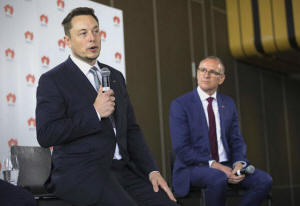|
Tesla wins giant battery contract in
Australia, has 100-day deadline
 Send a link to a friend
Send a link to a friend
 [July 07, 2017]
By Colin Packham and James Regan [July 07, 2017]
By Colin Packham and James Regan
SYDNEY (Reuters) - Tesla Inc <TSLA.O> has
won an Australian contract to install the world's biggest grid-scale
battery, in what experts say will be a litmus test for the reliability
of large-scale renewable energy.
Tesla's CEO Elon Musk, known for his bold approach to cars, clean energy
and space exploration, trumped dozens of competing proposals to build
the gigantic lithium-ion battery that will serve as emergency back-up
power for South Australia - a state racked by outages.
But under the agreement, Tesla must deliver the 100-MW battery within
100 days of the contract being signed or it will be free - a commitment
Musk made in a Tweet in March.
"There will be a lot of people that will look at this -'Did they get it
done within 100 days? Did it work?'" Musk told reporters in South
Australia's capital city of Adelaide.
"We are going to make sure it does."
The battery, designed to light up 30,000 homes if there is a blackout,
will be built on a wind farm operated by France's Neoen - parts of which
are still under construction.

Musk said failing to deliver the project in time would cost his company
"$50 million or more", without elaborating.
It will be the largest lithium-ion battery storage project in the world,
overtaking an 80 megawatt-hour facility in California, also built using
Tesla batteries.
Over the last three years, South Australia has decided to shut down its
coal-fired power stations and instead rely on wind, solar and gas. In
particular it has raced ahead of the rest of the country in turning to
wind power, which supplies 40 percent of its energy.
The move has been applauded by environmentalists but left the state
prone to outages as there is no way to store enough energy when the wind
doesn't blow. In September, South Australia's 1.7 million residents were
left without power, some of them for up to two weeks, when the grid
overloaded and collapsed.
The battery is aimed at getting around the problem of inadequate
storage.
"Cost-effective storage of electrical energy is the only problem holding
us back from getting all of our power from wind and solar," said Ian
Lowe a professor of science at Australia's Griffith University.
"This project is a significant innovation to demonstrate the feasibility
of large-scale storage."
[to top of second column] |

South Australian Premier Jay Weatherill (R) listens to Tesla Chief
Executive Officer Elon Musk speak during an official ceremony in
Adelaide, Australia, July 7, 2017 to announce that Tesla will
install the world's largest grid-scale battery in the South
Australian state. AAP/Ben Macmahon/via REUTERS

LITHIUM AMBITIONS
Dozens of companies from 10 countries, including privately owned
Lyon Group, working with U.S. power company AES Corp <AES.N>,
expressed interest in the project.
Now the sector is waiting to see if Musk can make good on his
promise.
"Tesla has been telling the world that it can and will finish the
project within three months, said a source at a Korean competitor to
Tesla, declining to be identified due to the sensitivity of the
matter.
"It seems that confidence helped Tesla win, but typically this kind
of project takes six months so we have to wait and see whether or
not Tesla can do it," the source said.
Lithium-ion batteries have been in widespread use since about 1991,
but mostly on a small scale, such as in laptops and cell phones. A
typical lithium-ion battery can store 150 watt-hours of electricity
in 1 kilogram of battery, representing more than double the capacity
of nickel batteries.
For their proponents who have long been pushing for grander use, the
success of Musk's big South Australian experiment will be key to
greater acceptance.
"For lithium technology to take off on a global scale, they clearly
need the storage capacity to make sure renewables can deliver 24
hours a day, seven days a week," said Adrian Griffin, a geologist
who specializes in lithium extraction.
(Reporting by Colin Packham and James Regan in SYDNEY. Additional
reporting by Sonali Paul in MELBOURNE. Writing by Jonathan Barrett.
Editing by Bill Tarrant and Edwina Gibbs)
[© 2017 Thomson Reuters. All rights
reserved.]
Copyright 2017 Reuters. All rights reserved. This material may not be published,
broadcast, rewritten or redistributed.
 |